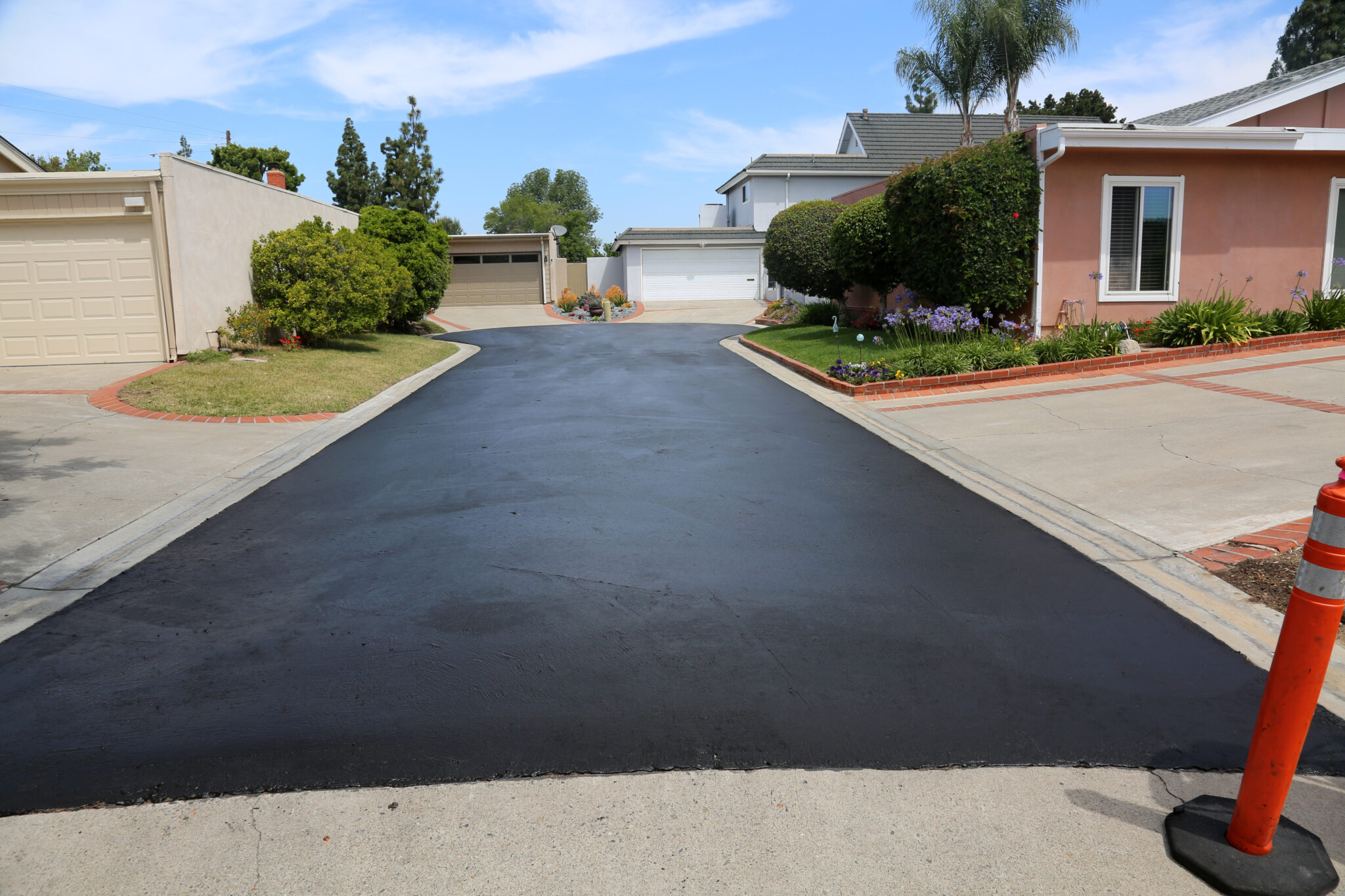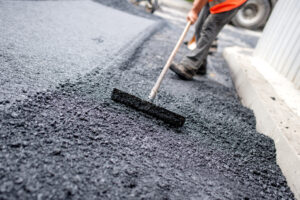In 2024, improving your property’s value and functionality with an asphalt driveway is an appealing idea. An asphalt driveway has many advantages, but as a homeowner, it’s important to understand the costs and benefits before making a decision. Below, we’ll discuss some of the cost factors that you should take into account when considering an asphalt driveway, including materials, labor costs, and long-term maintenance.
Understanding New Asphalt Driveway Costs
Estimating the cost of a new asphalt driveway involves various factors. Raw material prices, heavily influenced by crude oil prices, play a large role since asphalt is petroleum-based. The complexity of the design and desired thickness also affect costs. Labor expenses can vary based on location, contractor expertise, and the time of year you want to pave a driveway. Additionally, prep work like grading, foundation tasks, and removing existing driveways or obstacles all add to the total cost. With this being said, the total cost for an asphalt driveway in 2024 ranges from $3,000 to $8000, with the national average falling at about $4,500. Let’s break down the factors that can impact the final price.
Material Costs for Asphalt Driveways
Material costs are a key component when calculating the overall cost of an asphalt driveway. The primary materials used are the asphalt itself and the base material that supports the asphalt layer. The quality of asphalt can vary, with certain types of mixtures providing increased durability but at a higher cost.
The base material for the asphalt is another factor. The thickness and type of base required will depend on soil conditions and climate, which can significantly influence the end price. Some regions may require a thicker base to prevent heaving from freeze-thaw cycles, increasing material usage and cost. Always consult with a professional to assess the right type and amount of materials needed for your specific project.
Hot Mix Asphalt
Hot mix asphalt (HMA) is the most common type of asphalt used in paving driveways due to its strong durability and ability to withstand various weather conditions. The price of HMA usually ranges from $0.75 – $2.00 depending on the mix type and quality of the asphalt.
HMA is produced by heating the asphalt binder and drying the aggregate to remove moisture before mixing. This process makes a malleable compound that can be laid down and compacted to form a dense, long-lasting pavement surface. Its fast curing time allows for driveways to be functional shortly after paving.
Labor and Preparation Costs to Keep in Mind
Don’t forget to factor in labor and preparation costs when planning for an asphalt driveway. These include site preparation, grading, excavation, and base material compaction. The cost of these activities can vary significantly depending on the size and complexity of your driveway but usually lies between $1-$2.50 per square foot.
After the preparation of the driveway, the asphalt is laid down and must be properly compacted to ensure a smooth and long-lasting surface. This process requires specialized machinery and skilled workers, adding an additional $2-$6 per square foot to the overall cost.
The location and accessibility of your property can also impact labor costs, as transporting materials and equipment may require more time and effort. Additionally, the cost of asphalt paving may vary depending on the current market conditions in your area.
While more experienced contractors cost more upfront, it can save you money in the long run if the driveway is paved properly and purposefully. Carefully consider your budget and research reputable contractors to find the best fit for your needs.
Additional Costs to Consider
Besides the usual labor and prep, homeowners should keep in mind some extra costs that could affect the total spent on their new asphalt driveway. Things like drainage solutions to avoid water build-up and protect the driveway’s structure are important but often forgotten expenses. Consulting with your contractor and considering these additional costs from the start can help prevent unexpected expenses down the road.
The existing material of your driveway can also impact the cost of paving with asphalt. If your driveway is currently made of concrete, it may require additional work (and costs) to remove and dispose of it before laying down the asphalt. Similarly, if there are trees or other obstacles in the way, they may need to be removed or relocated before paving can begin.
Maintenance Costs of an Asphalt Driveway
After installing an asphalt driveway, homeowners should also consider the long-term maintenance costs. While asphalt is a durable material, regular upkeep and repairs are necessary for a longer lifespan. This may include patching up cracks or potholes, sealcoating every few years, and cleaning and removing debris regularly.
Sealcoating: One of the most important maintenance tasks for an asphalt driveway is sealcoating. This involves applying a protective layer over the surface of the asphalt to prevent water, UV rays, and other elements from damaging it. Sealcoating should be done every two to three years to maintain the integrity and appearance of your driveway. The cost of sealcoating is usually between $0.15 – $0.30 per square foot.
If you just had an asphalt driveway installed, wait at least six months to a year before sealcoating to allow the asphalt to fully cure.
Crack Filling: As with any type of pavement, cracks can develop in an asphalt driveway over time. These should be addressed promptly to prevent them from spreading and causing further damage. Filling cracks with a specialized sealant is a cost-effective way to extend the life of your driveway.
The cost to repair these cracks depends on the amount and size, but it is generally around $2 to $5 per square foot.
Pothole Repair: Potholes are larger than cracks and require more intensive repairs. They can form when water seeps into small cracks and freezes, expanding and causing the pavement to break apart. The cost to repair this unsightly damage is between $7 – $10 per square foot.
It is always more cost-effective to prevent potholes from forming in the first place. This can be done by addressing any cracks in the driveway and having a proper drainage system.
Cleaning and Debris Removal: To maintain the appearance of your driveway, it’s important to regularly clean off dirt, leaves, and other debris. This makes your driveway look more attractive and prevents potential damage from debris buildup.
This is one of the easiest ways to extend the lifespan of your driveway. Keeping your driveway clean can also help you catch any potential issues, such as cracks or potholes, before they become major problems.
Oil Stains: Oil stains are common on driveways, especially if you park your car there regularly. These stains can be unpleasant to look at and difficult to remove, but it’s important to clean them up as soon as possible to prevent further damage and costs.
You can do this with cheap household items in most cases, but tougher stains may require pressure washing with a solvent made for removing oil stains.
Proper maintenance can extend the lifespan of your driveway by preventing further damage and avoiding costly replacements in the future. Regularly inspect your driveway and work with a professional asphalt repair company to address any issues.
Final Considerations Before Installing an Asphalt Driveway
Understanding the overall costs of installing a new asphalt driveway is important for homeowners looking to upgrade their current driveway. An asphalt driveway can be a great investment, but like any home improvement project, it takes careful planning and consideration. If you have any questions about budgeting for an asphalt driveway, feel free to reach out to us. At Superior Asphalt, we take pride in providing top-notch materials and asphalt maintenance services, ensuring the longevity of your driveway. Contact us for a property-specific quote!



